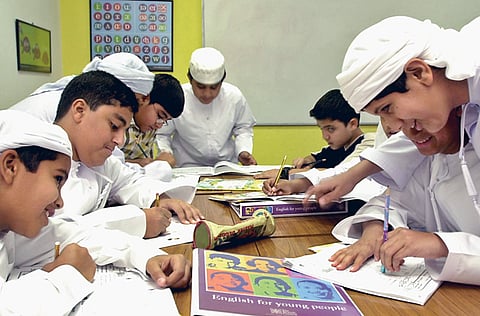Why Arab students find English tricky
BUiD study indicates that insufficient attention is paid to spelling principles

English spelling mistakes made by Emirati students result from a lack of importance placed on spelling lessons said the dean of education at the British University in Dubai (BUiD).
In a study, Dr Mick Randall collected Arab learners' tests from the Common Educational Proficiency Assessment (CEPA) given at the UAE higher education institutions. He used the tests to analyse common writing mistakes in relation to orthography (the study of letters and spelling in language) and word recognition in English by Emirati students.
The CEPA tests are taken by students for placement at Zayed University, the Higher Colleges of Technology and UAE University.
Differently wired
"The way we read words is determined by the sounds of the language or the orthography of different scripts. [This is why] Arab students have such enormous problems reading and writing English," said Randall.
"In psychological literature people are very unaware that when it comes to linguistics, it isn't universal how brains are wired," said Randall. This is due to the variations in languages in terms of sounds and scripts.
"[Arab students] have different [word] search patterns because their linguistic language affects their perception," he added.
He said for native English speakers the letters of an English word identified phonetically formulate a picture in the brain associated with a meaning. However, for Emirati students this is not the case as Arabic spelling does not work in the same way. "Brains do get framed in a different way for other languages [besides English]," he said. "European languages dominate the world and most research is conducted in English so nobody questions ... other languages," Randall added.
"I think teacher training colleges do a bad job of teaching phonology," said Randall. "For the last 20 years learning English has been about meaning whereas rhyme is critical to teaching English spelling." (Phonology is the study of speech sounds and the rules of pronunciation in a language.)
Randall explained that instead of teaching Arab students to recognise the sounds of English words, teachers concentrate on getting students to speak properly.
"This is an impossible task — to make people in their late teens or early twenties change their pronunciation," he said.
Finding solutions
Instead, Randall believes emphasis should be placed on training teachers to become aware of the different systems based on contrasting analysis and how they affect spelling and reading.
"Each country should have a different programme to focus on particular English language learning problems of that country," he said. "In order to produce students who speak better English, people must be made aware of the different language systems and how they affect English spelling and reading."
However, this must begin with phonology being incorporated as a module in teacher training courses said Randall. "I firmly believe phonology courses should be included in teacher training as a feature of the English language that is important for spelling," he said.



